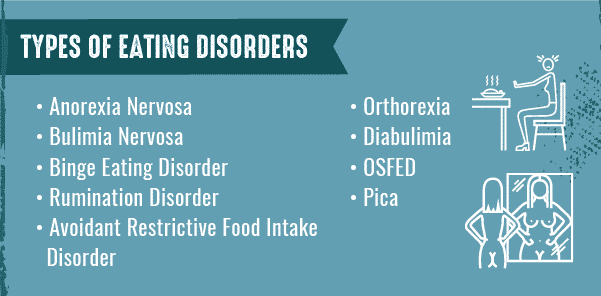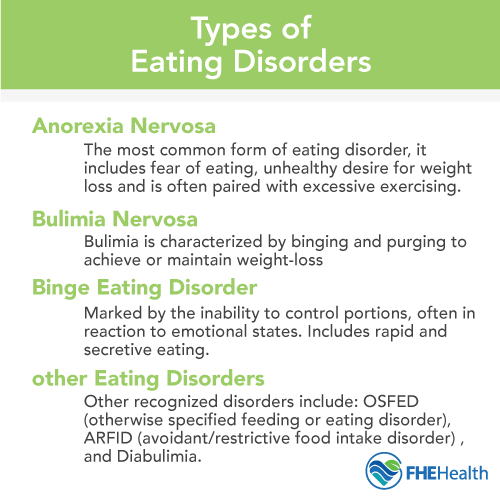Eating Disorder Recovery Can Be Fun For Anyone
Wiki Article
What Does Eating Disorder Recovery Mean?
Table of ContentsWhat Does Eating Disorder Recovery Do?Eating Disorder Recovery Things To Know Before You BuyThe Ultimate Guide To Eating Disorder RecoveryEating Disorder Recovery - TruthsSome Of Eating Disorder Recovery

While many people make a point to be conscious of the components and sourcing of their food, orthorexia can become damaging to the individual's wellness. Ultimately, particular foods or entire teams are eliminated from the person's diet plan; they could additionally begin to stress over the ingredients in their foods, investing hours each day planning dishes.
Food active ingredients might additionally end up being the person's just subject of conversation. Orthorexia is likewise a typical co-occurring condition connected with OCD.
The Eating Disorder Recovery PDFs
With this condition, a person will purely stay clear of particular foods to the detriment of their health - eating disorder recovery. Unlike orthorexia, nonetheless, the evasion of specific foods isn't driven by ideas of the food's healthfulness or purity, however rather by an extreme aversion to the food's taste, appearance, or smell (although problems regarding perishing or food poisoning may likewise be existing).Over time, increasingly more foods end up being illogical, leading to an exceptionally restricted palette of acceptable foods. Formerly referred to as careful eating disorder, ARFID usually starts in childhood years and also progressively worsens over time. It's reasonably usual for youngsters to be "particular eaters" and every person has preferences for what they eat, yet if it ends up being uncontrollable and destructive to an individual's wellness, it warrants a check-in with an eating problem treatment professional.
Like orthorexia, an adverse or altered body image is not necessarily a cause of the problem. ARFID is typically dealt with utilizing talk therapy as well as cognitive re-training such as Cognitive Behavior Therapy (CBT). Unlike many eating conditions which typically initially present throughout adolescence, rumination condition is most typical in early stage and early childhood, although it can continue right into the adult years.
The Greatest Guide To Eating Disorder Recovery
Typically, they do not experience stress or disgust when throwing up, neither do they appear to make an initiative to throw up (as seen in bulimia nervosa). Rumination disorder is frequently a reaction to an illogical worry of disease caused by consuming, although its causes are much less well-understood than other eating conditions.

Orthorexia is a kind of consuming disorder, still unknown in the DSM, wherein an individual comes to be consumed with "healthy and balanced consuming." While many individuals emphasize to be mindful of the active ingredients and sourcing of their food, orthorexia can end up being detrimental to the individual's health and wellness. Orthorexia creates individuals to determine details food or food groups as "proper," "healthy and balanced," or "pure." Ultimately, certain foods or whole groups are removed from the person's diet plan; they may also begin to stress over the ingredients in their foods, investing hours daily preparation meals.
Indicators on Eating Disorder Recovery You Need To Know
try these out
With this condition, a person will strictly stay clear of certain foods to the detriment of their health. Unlike orthorexia, nonetheless, the avoidance of certain foods isn't driven by concepts of the food's healthiness or pureness, but instead by a serious aversion to the food's taste, appearance, or smell (although problems about spoilage or gastrointestinal disorder might also exist).
Gradually, a growing number of foods end up being untenable, causing an incredibly minimal combination of acceptable foods. Previously referred to as careful eating condition, ARFID typically begins in childhood years and considerably gets worse in time. It's fairly usual for children to be "picky eaters" and every person has choices wherefore they eat, but if it becomes compulsive as well as harmful to a person's wellness, it requires a check-in with an eating disorder therapy professional.
7 Simple Techniques For Eating Disorder Recovery
Likewise like orthorexia, an unfavorable or altered body photo is not necessarily a reason for the disorder. ARFID is usually dealt with using talk treatment and cognitive re-training such as Cognitive Behavior Modification (CBT). Unlike most eating disorders which typically initially present throughout adolescence, rumination problem is most usual in early stage as well as early childhood, although it can continue right into adulthood.Generally, they do not experience anxiety or disgust when spitting up, click here now neither do they appear to make an effort to throw up (as seen in bulimia nervosa). Rumination condition is commonly a reaction to an unreasonable worry of health problem created by eating, although its causes are less well-understood than various other eating conditions.
Rumination condition is detailed in the DSM-V. Among the most unsafe types of eating condition, ED-DMT1 (colloquially called diabulimia), happens when an individual with type-1 diabetes mellitus purposefully misses their insulin dosage to slim down. Diabulimia is detailed as one of the many undefined consuming disorders under the catchall term OSFED (Other Specified Feeding r Consuming Condition).
Report this wiki page